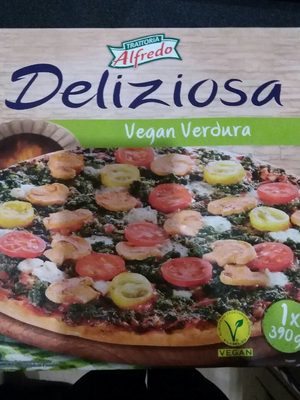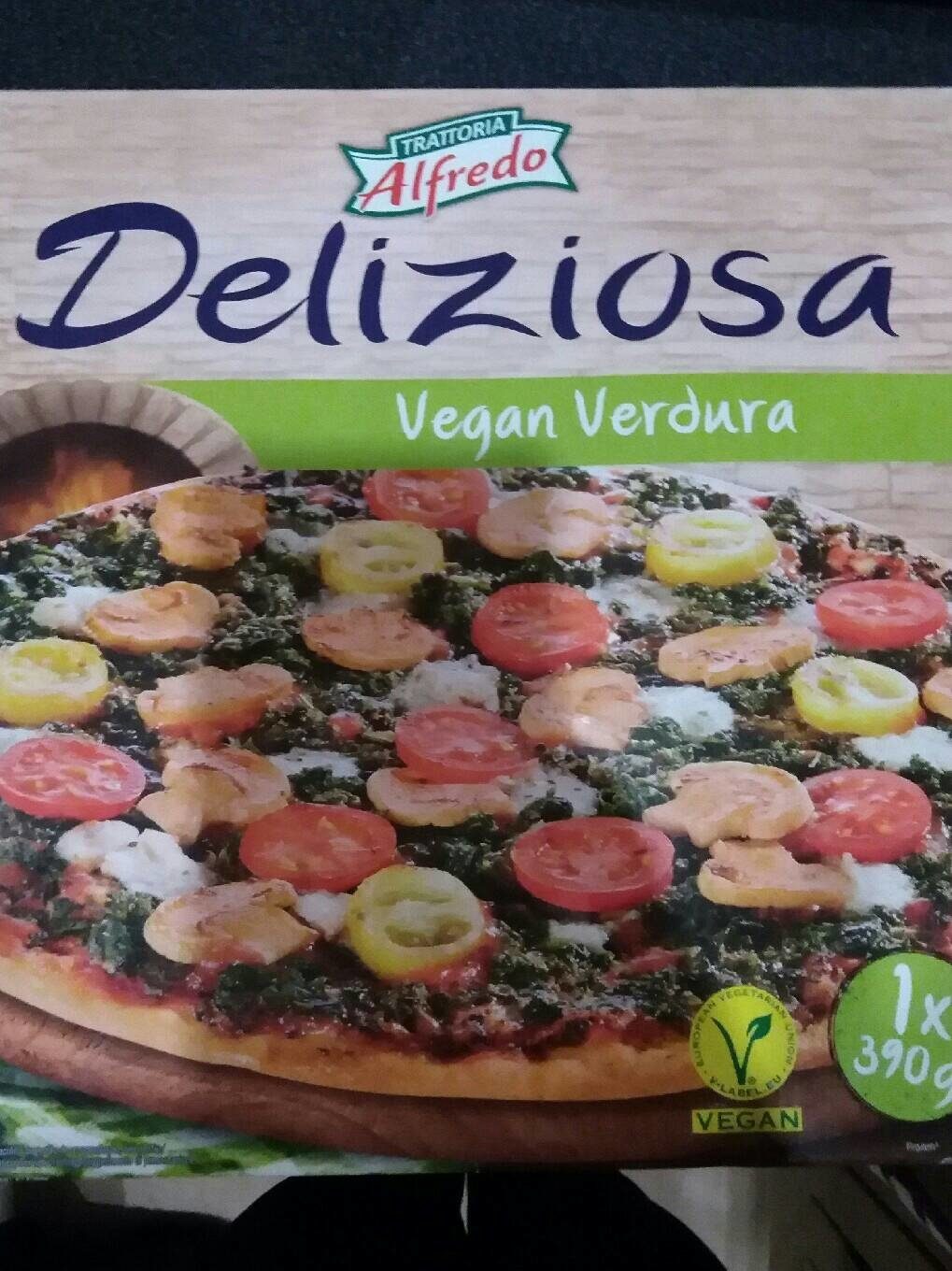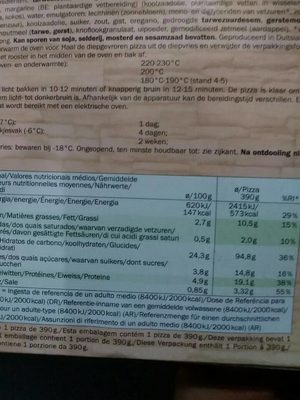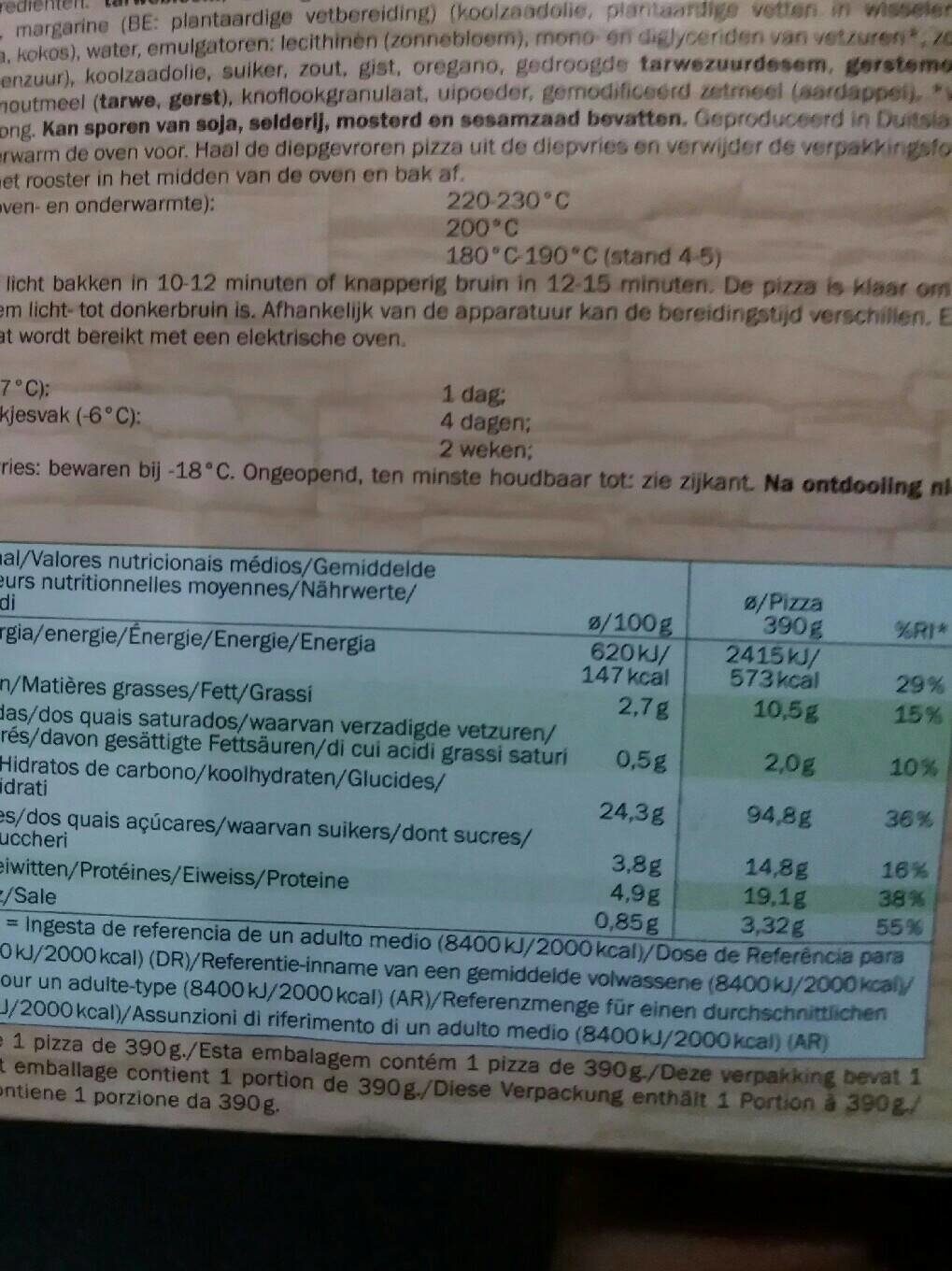Help us make food transparency the norm!
As a non-profit organization, we depend on your donations to continue informing consumers around the world about what they eat.
The food revolution starts with you!
Trattoria Alfredo Pizza Deliziosa Vegan Verdura - 390 g
Trattoria Alfredo Pizza Deliziosa Vegan Verdura - 390 g
Ambiguous barcode: This product has a Restricted Circulation Number barcode for products within a company. This means that different producers and stores can use the same barcode for different products.
×
This product page is not complete. You can help to complete it by editing it and adding more data from the photos we have, or by taking more photos using the app for Android or iPhone/iPad. Thank you!
×
Barra-kodea: 20864842
Kopurua: 390 g
Ontziratzea: en:Cardboard, 21 PAP, LDPE, fr:Fsc, fr:Green dot
Markak: Trattoria Alfredo
Kategoriak: en:Frozen foods, en:Meals, en:Pizzas pies and quiches, en:Pizzas, en:Vegetarian pizzas, en:Frozen pizzas and pies, en:Frozen pizzas, en:Vegetable pizza
Etiketak, ziurtagiriak, sariak:
en:Vegetarian, en:Vegan, en:European Vegetarian Union, en:European Vegetarian Union Vegan, en:FSC, en:FSC Mix, en:Green Dot, sv:FSC-C012270



Manufacturing or processing places: Allemagne
Traceability code: FSC-C012270
Dendak: Lidl
Saltzen diren herrialdeak: Txekia, Frantzia, Espainia, Suedia, Suitza
Matching with your preferences
Health
Osagaiak
-
32 ingredients
: farine de blé, 20% tomates concassées, 18% épinards, eau, 12,8% tomates cerises, 7,7 % champignons de Paris, margarine (BE: préparation de matières grasses végétales) (huile de colza, graisses végétales en proportion variable (karité, coco), eau, émulsifiants: lécithines (tournesol), mono - et diglycérides d'acides gras*; sel de cuisine, acidifiant: acide citrique), huile de colza, sucre, sel de cuisine, levure, origan, levain de blé déshydraté, farine de malt d'orge, farine de malt grillé (blé, orge), granulés d'ail, oignon en poudre, amidon modifié (pomme de terre). *d'origine végétale. Peut contenir des traces de soja, de céleri, de moutarde et de graines de sésame. Élaboré en Allemagne.Alergenoak: en:GlutenAztarnak: en:Celery, en:Mustard, en:Sesame seeds, en:Soybeans
Food processing
-
Ultra processed foods
Elements that indicate the product is in the 4 - Ultra prozesatutako elikagaiak eta edariak group:
- Gehigarria: E14XX
- Gehigarria: E322
- Gehigarria: E471
- Osagaia: Emulsifier
Food products are classified into 4 groups according to their degree of processing:
- Prozesatu gabeko edo ahalik eta gutxien prozesatutako elikagaiak
- Sukaldaritzako osagaiak prozesatu
- Prozesatutako jakiak
- Ultra processed foods
The determination of the group is based on the category of the product and on the ingredients it contains.
Gehigarriak
-
E322
Lecithin: Lecithin -UK: , US: , from the Greek lekithos, "egg yolk"- is a generic term to designate any group of yellow-brownish fatty substances occurring in animal and plant tissues, which are amphiphilic – they attract both water and fatty substances -and so are both hydrophilic and lipophilic-, and are used for smoothing food textures, dissolving powders -emulsifying-, homogenizing liquid mixtures, and repelling sticking materials.Lecithins are mixtures of glycerophospholipids including phosphatidylcholine, phosphatidylethanolamine, phosphatidylinositol, phosphatidylserine, and phosphatidic acid.Lecithin was first isolated in 1845 by the French chemist and pharmacist Theodore Gobley. In 1850, he named the phosphatidylcholine lécithine. Gobley originally isolated lecithin from egg yolk—λέκιθος lekithos is "egg yolk" in Ancient Greek—and established the complete chemical formula of phosphatidylcholine in 1874; in between, he had demonstrated the presence of lecithin in a variety of biological matters, including venous blood, in human lungs, bile, human brain tissue, fish eggs, fish roe, and chicken and sheep brain. Lecithin can easily be extracted chemically using solvents such as hexane, ethanol, acetone, petroleum ether, benzene, etc., or extraction can be done mechanically. It is usually available from sources such as soybeans, eggs, milk, marine sources, rapeseed, cottonseed, and sunflower. It has low solubility in water, but is an excellent emulsifier. In aqueous solution, its phospholipids can form either liposomes, bilayer sheets, micelles, or lamellar structures, depending on hydration and temperature. This results in a type of surfactant that usually is classified as amphipathic. Lecithin is sold as a food additive and dietary supplement. In cooking, it is sometimes used as an emulsifier and to prevent sticking, for example in nonstick cooking spray.Source: Wikipedia (Ingeles)
-
E322i - Lezitina
Lecithin: Lecithin -UK: , US: , from the Greek lekithos, "egg yolk"- is a generic term to designate any group of yellow-brownish fatty substances occurring in animal and plant tissues, which are amphiphilic – they attract both water and fatty substances -and so are both hydrophilic and lipophilic-, and are used for smoothing food textures, dissolving powders -emulsifying-, homogenizing liquid mixtures, and repelling sticking materials.Lecithins are mixtures of glycerophospholipids including phosphatidylcholine, phosphatidylethanolamine, phosphatidylinositol, phosphatidylserine, and phosphatidic acid.Lecithin was first isolated in 1845 by the French chemist and pharmacist Theodore Gobley. In 1850, he named the phosphatidylcholine lécithine. Gobley originally isolated lecithin from egg yolk—λέκιθος lekithos is "egg yolk" in Ancient Greek—and established the complete chemical formula of phosphatidylcholine in 1874; in between, he had demonstrated the presence of lecithin in a variety of biological matters, including venous blood, in human lungs, bile, human brain tissue, fish eggs, fish roe, and chicken and sheep brain. Lecithin can easily be extracted chemically using solvents such as hexane, ethanol, acetone, petroleum ether, benzene, etc., or extraction can be done mechanically. It is usually available from sources such as soybeans, eggs, milk, marine sources, rapeseed, cottonseed, and sunflower. It has low solubility in water, but is an excellent emulsifier. In aqueous solution, its phospholipids can form either liposomes, bilayer sheets, micelles, or lamellar structures, depending on hydration and temperature. This results in a type of surfactant that usually is classified as amphipathic. Lecithin is sold as a food additive and dietary supplement. In cooking, it is sometimes used as an emulsifier and to prevent sticking, for example in nonstick cooking spray.Source: Wikipedia (Ingeles)
-
E330 - Azido zitriko
Citric acid: Citric acid is a weak organic acid that has the chemical formula C6H8O7. It occurs naturally in citrus fruits. In biochemistry, it is an intermediate in the citric acid cycle, which occurs in the metabolism of all aerobic organisms. More than a million tons of citric acid are manufactured every year. It is used widely as an acidifier, as a flavoring and chelating agent.A citrate is a derivative of citric acid; that is, the salts, esters, and the polyatomic anion found in solution. An example of the former, a salt is trisodium citrate; an ester is triethyl citrate. When part of a salt, the formula of the citrate ion is written as C6H5O3−7 or C3H5O-COO-3−3.Source: Wikipedia (Ingeles)
-
E471
Mono- and diglycerides of fatty acids: Mono- and diglycerides of fatty acids -E471- refers to a food additive composed of diglycerides and monoglycerides which is used as an emulsifier. This mixture is also sometimes referred to as partial glycerides.Source: Wikipedia (Ingeles)
Ingredients analysis
-
en:May contain palm oil
Ingredients that may contain palm oil: E471
-
en:Vegan
No non-vegan ingredients
Unrecognized ingredients: en:Dried wheat sourdough, fr:granules-d-ail, fr:elabore-en-allemagneSome ingredients could not be recognized.
We need your help!
You can help us recognize more ingredients and better analyze the list of ingredients for this product and others:
- Edit this product page to correct spelling mistakes in the ingredients list, and/or to remove ingredients in other languages and sentences that are not related to the ingredients.
- Add new entries, synonyms or translations to our multilingual lists of ingredients, ingredient processing methods, and labels.
If you would like to help, join the #ingredients channel on our Slack discussion space and/or learn about ingredients analysis on our wiki. Thank you!
-
en:Vegetarian
No non-vegetarian ingredients detected
Unrecognized ingredients: en:Dried wheat sourdough, fr:granules-d-ail, fr:elabore-en-allemagneSome ingredients could not be recognized.
We need your help!
You can help us recognize more ingredients and better analyze the list of ingredients for this product and others:
- Edit this product page to correct spelling mistakes in the ingredients list, and/or to remove ingredients in other languages and sentences that are not related to the ingredients.
- Add new entries, synonyms or translations to our multilingual lists of ingredients, ingredient processing methods, and labels.
If you would like to help, join the #ingredients channel on our Slack discussion space and/or learn about ingredients analysis on our wiki. Thank you!
-
Details of the analysis of the ingredients
We need your help!
Some ingredients could not be recognized.
We need your help!
You can help us recognize more ingredients and better analyze the list of ingredients for this product and others:
- Edit this product page to correct spelling mistakes in the ingredients list, and/or to remove ingredients in other languages and sentences that are not related to the ingredients.
- Add new entries, synonyms or translations to our multilingual lists of ingredients, ingredient processing methods, and labels.
If you would like to help, join the #ingredients channel on our Slack discussion space and/or learn about ingredients analysis on our wiki. Thank you!
: farine de blé, tomates concassées 20%, épinards 18%, eau, tomates cerises 12.8%, champignons de Paris 7.7%, margarine (huile de colza, graisses végétales de karité, graisses végétales de coco, eau, émulsifiants (lécithines de tournesol), mono- et diglycérides d'acides gras, sel de cuisine, acidifiant (acide citrique)), huile de colza, sucre, sel de cuisine, levure, origan, levain de blé déshydraté, farine de malt d'orge, malt (blé, orge), granulés d'ail, oignon, amidon modifié (pomme de terre), Élaboré en Allemagne- farine de blé -> en:wheat-flour - vegan: yes - vegetarian: yes - ciqual_proxy_food_code: 9410 - percent_min: 20 - percent_max: 28.7
- tomates concassées -> en:chopped-tomatoes - vegan: yes - vegetarian: yes - ciqual_food_code: 20047 - percent_min: 20 - percent: 20 - percent_max: 20
- épinards -> en:spinach - vegan: yes - vegetarian: yes - ciqual_food_code: 20059 - percent_min: 18 - percent: 18 - percent_max: 18
- eau -> en:water - vegan: yes - vegetarian: yes - ciqual_food_code: 18066 - percent_min: 12.8 - percent_max: 18
- tomates cerises -> en:cherry-tomato - vegan: yes - vegetarian: yes - ciqual_food_code: 20172 - percent_min: 12.8 - percent: 12.8 - percent_max: 12.8
- champignons de Paris -> en:cultivated-mushroom - vegan: yes - vegetarian: yes - ciqual_food_code: 20010 - percent_min: 7.7 - percent: 7.7 - percent_max: 7.7
- margarine -> en:margarine - vegan: en:yes - vegetarian: en:yes - percent_min: 0 - percent_max: 5.34
- huile de colza -> en:colza-oil - vegan: yes - vegetarian: yes - from_palm_oil: no - ciqual_food_code: 17130 - percent_min: 0 - percent_max: 5.34
- graisses végétales de karité -> en:shea-butter - vegan: yes - vegetarian: yes - from_palm_oil: no - percent_min: 0 - percent_max: 2.67
- graisses végétales de coco -> en:coconut-oil - vegan: yes - vegetarian: yes - from_palm_oil: no - ciqual_food_code: 16040 - percent_min: 0 - percent_max: 1.78
- eau -> en:water - vegan: yes - vegetarian: yes - ciqual_food_code: 18066 - percent_min: 0 - percent_max: 1.335
- émulsifiants -> en:emulsifier - percent_min: 0 - percent_max: 1.068
- lécithines de tournesol -> en:sunflower-lecithin - vegan: yes - vegetarian: yes - percent_min: 0 - percent_max: 1.068
- mono- et diglycérides d'acides gras -> en:e471 - vegan: maybe - vegetarian: maybe - from_palm_oil: maybe - percent_min: 0 - percent_max: 0.89
- sel de cuisine -> en:salt - vegan: yes - vegetarian: yes - ciqual_food_code: 11058 - percent_min: 0 - percent_max: 0.85
- acidifiant -> en:acid - percent_min: 0 - percent_max: 0.6675
- acide citrique -> en:e330 - vegan: yes - vegetarian: yes - percent_min: 0 - percent_max: 0.6675
- huile de colza -> en:colza-oil - vegan: yes - vegetarian: yes - from_palm_oil: no - ciqual_food_code: 17130 - percent_min: 0 - percent_max: 4.45
- sucre -> en:sugar - vegan: yes - vegetarian: yes - ciqual_proxy_food_code: 31016 - percent_min: 0 - percent_max: 3.8
- sel de cuisine -> en:salt - vegan: yes - vegetarian: yes - ciqual_food_code: 11058 - percent_min: 0 - percent_max: 0.85
- levure -> en:yeast - vegan: yes - vegetarian: yes - percent_min: 0 - percent_max: 0.85
- origan -> en:oregano - vegan: yes - vegetarian: yes - ciqual_proxy_food_code: 11035 - percent_min: 0 - percent_max: 0.85
- levain de blé déshydraté -> en:dried-wheat-sourdough - percent_min: 0 - percent_max: 0.85
- farine de malt d'orge -> en:barley-malt-flour - vegan: yes - vegetarian: yes - ciqual_food_code: 9550 - percent_min: 0 - percent_max: 0.85
- malt -> en:malt - vegan: yes - vegetarian: yes - percent_min: 0 - percent_max: 0.85
- blé -> en:wheat - vegan: yes - vegetarian: yes - ciqual_proxy_food_code: 9410 - percent_min: 0 - percent_max: 0.85
- orge -> en:barley - vegan: yes - vegetarian: yes - percent_min: 0 - percent_max: 0.425
- granulés d'ail -> fr:granules-d-ail - percent_min: 0 - percent_max: 0.85
- oignon -> en:onion - vegan: yes - vegetarian: yes - ciqual_food_code: 20034 - percent_min: 0 - percent_max: 0.85
- amidon modifié -> en:modified-starch - vegan: yes - vegetarian: yes - ciqual_proxy_food_code: 9510 - percent_min: 0 - percent_max: 0.85
- pomme de terre -> en:potato - vegan: yes - vegetarian: yes - ciqual_food_code: 4003 - percent_min: 0 - percent_max: 0.85
- Élaboré en Allemagne -> fr:elabore-en-allemagne - percent_min: 0 - percent_max: 0.85
Elikadura
-
Good nutritional quality
⚠ ️Abisua: zuntz kopurua ez dago zehaztuta, ezin izan dute kontuan izan kalifikaziorako izan dezaketen ekarpen positiboa.⚠ ️Warning: the amount of fruits, vegetables and nuts is not specified on the label, it was estimated from the list of ingredients: 59This product is not considered a beverage for the calculation of the Nutri-Score.
Positive points: 4
- Proteinak: 3 / 5 (balioa: 4.9, rounded value: 4.9)
- Fiber: 0 / 5 (balioa: 0, rounded value: 0)
- Fruits, vegetables, nuts, and colza/walnut/olive oils: 1 / 5 (balioa: 59.375, rounded value: 59.4)
Negative points: 4
- Energia: 1 / 10 (balioa: 618, rounded value: 618)
- Azukreak: 0 / 10 (balioa: 3.8, rounded value: 3.8)
- Gantz saturatua: 0 / 10 (balioa: 0.5, rounded value: 0.5)
- Sodioa: 3 / 10 (balioa: 340, rounded value: 340)
The points for proteins are counted because the negative points are less than 11.
Nutritional score: (4 - 4)
Nutri-Score:
-
Nutrient levels
-
Koipe in low quantity (2.7%)
What you need to know- A high consumption of fat, especially saturated fats, can raise cholesterol, which increases the risk of heart diseases.
Recommendation: Limit the consumption of fat and saturated fat- Choose products with lower fat and saturated fat content.
-
Gantz-azido ase in low quantity (0.5%)
What you need to know- A high consumption of fat, especially saturated fats, can raise cholesterol, which increases the risk of heart diseases.
Recommendation: Limit the consumption of fat and saturated fat- Choose products with lower fat and saturated fat content.
-
Azukre in low quantity (3.8%)
What you need to know- A high consumption of sugar can cause weight gain and tooth decay. It also augments the risk of type 2 diabetes and cardio-vascular diseases.
Recommendation: Limit the consumption of sugar and sugary drinks- Sugary drinks (such as sodas, fruit beverages, and fruit juices and nectars) should be limited as much as possible (no more than 1 glass a day).
- Choose products with lower sugar content and reduce the consumption of products with added sugars.
-
Gatz arrunt in moderate quantity (0.85%)
What you need to know- A high consumption of salt (or sodium) can cause raised blood pressure, which can increase the risk of heart disease and stroke.
- Many people who have high blood pressure do not know it, as there are often no symptoms.
- Most people consume too much salt (on average 9 to 12 grams per day), around twice the recommended maximum level of intake.
Recommendation: Limit the consumption of salt and salted food- Reduce the quantity of salt used when cooking, and don't salt again at the table.
- Limit the consumption of salty snacks and choose products with lower salt content.
-
-
Nutrition facts
Nutrition facts As sold
for 100 g / 100 mlAs sold
per serving (390 g)Compared to: en:Vegetable pizza Energia 618 kj
(147 kcal)2.410 kj
(573 kcal)-% 20 Koipe 2,7 g 10,5 g -% 51 Gantz-azido ase 0,5 g 1,95 g -% 75 Carbohydrates 24,3 g 94,8 g -% 2 Azukre 3,8 g 14,8 g +% 24 Fiber ? ? Proteina 4,9 g 19,1 g -% 27 Gatz arrunt 0,85 g 3,32 g -% 17 Fruits‚ vegetables‚ nuts and rapeseed‚ walnut and olive oils (estimate from ingredients list analysis) 59,375 % 59,375 %
Ingurumena
-
Eco-Score C - Moderate environmental impact
The Eco-Score is an experimental score that summarizes the environmental impacts of food products.→ The Eco-Score was initially developped for France and it is being extended to other European countries. The Eco-Score formula is subject to change as it is regularly improved to make it more precise and better suited to each country.Life cycle analysis
-
Average impact of products of the same category: B (Score: 60/100)
Kategoria: Pizza, vegetables or pizza 4 seasons
Kategoria: Pizza, vegetables or pizza 4 seasons
- PEF environmental score: 0.43 (the lower the score, the lower the impact)
- including impact on climate change: 3.26 kg CO2 eq/kg of product
Stage Impact Agriculture
69.4 %Processing
12.5 %Ontziratzea
3.9 %Transportation
4.2 %Distribution
2.1 %Consumption
7.9 %
Bonuses and maluses
-
Missing origins of ingredients information
Malus: -5
⚠ ️ The origins of the ingredients of this product are not indicated.
If they are indicated on the packaging, you can modify the product sheet and add them.
If you are the manufacturer of this product, you can send us the information with our free platform for producers.
-
Packaging with a medium impact
Malus: -9
Shape Material Recycling Impact Unknown 21 PAP Baxua Unknown LDPE Altua ⚠ ️ The information about the packaging of this product is not sufficiently precise (exact shapes and materials of all components of the packaging).⚠ ️ For a more precise calculation of the Eco-Score, you can modify the product page and add them.
If you are the manufacturer of this product, you can send us the information with our free platform for producers.
Eco-Score for this product
-
Impact for this product: C (Score: 46/100)
Produktua: Trattoria Alfredo Pizza Deliziosa Vegan Verdura - 390 g
Life cycle analysis score: 60
Sum of bonuses and maluses: -14
Final score: 46/100
-
Carbon footprint
-
Equal to driving 1.7 km in a petrol car
326 g CO² per 100g of product
The carbon emission figure comes from ADEME's Agribalyse database, for the category: Pizza, vegetables or pizza 4 seasons (Source: ADEME Agribalyse Database)
Stage Impact Agriculture
74.8 %Processing
9.1 %Ontziratzea
5.1 %Transportation
7.0 %Distribution
1.1 %Consumption
2.8 %
Ontziratzea
-
Packaging with a medium impact
-
Packaging parts
(21 PAP)
(LDPE)
-
Bilgarriaren materialak
Material % Bilgarriaren pisua Bilgarriaren pisua produktuaren 100g-ko Paper or cardboard Plastic Guztira
-
Transportation
-
Origins of ingredients
Missing origins of ingredients information
⚠ ️ The origins of the ingredients of this product are not indicated.
If they are indicated on the packaging, you can modify the product sheet and add them.
If you are the manufacturer of this product, you can send us the information with our free platform for producers.Add the origins of ingredients for this product Add the origins of ingredients for this product
Report a problem
-
Incomplete or incorrect information?
Category, labels, ingredients, allergens, nutritional information, photos etc.
If the information does not match the information on the packaging, please complete or correct it. Open Food Facts is a collaborative database, and every contribution is useful for all.
Datuen iturria
Product added on by kiliweb
Last edit of product page on by roboto-app.
Produktuaren orria -gatik editatua aleene, big-brother, foodrepo, neptuno, nicobur, olofolleola4, openfoodfacts-contributors, packbot, quechoisir, risajanda, segundo, thaialagata, vege-freek, yuka.SGFBUUVvRWx2NmNXb01jLzl6Lyt4dEZIeThhQVlrK0ZLdm9OSWc9PQ, yuka.ZTdJYktvQWxpdEFNcDhjazJqem82dHRFMktHNUJIS1hPdElTSWc9PQ.










